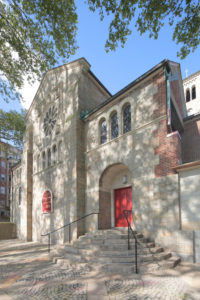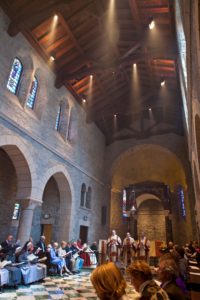A guest at our monastery asked what is most challenging about being a monk. One of my Brothers responded, “The monks!” That’s rather tongue-in-cheek; however, it’s often true. Those who know us the best can love us the most, and they can also disappoint or hurt us the worst.
Jesus presumed life together for his followers. Whether you are married or in a partnership, belong to an extended family, or share in a professional, volunteer, or church association, certain practices can be your making or – in their absence – your breaking. Here are some of the most important principles I’ve distilled from over 30 years of navigating life together with my Brothers:
Discover what matters. What is important to an individual may not be obvious to others. You may unwittingly “inflict good” on others (Mark Twain’s phrase) by presuming your values and preferences are identical to others’. Solicit information on what matters to the others in your group: How do they particularly feel remembered and appreciated? What dates have special meaning to them, or especially affect them (happily or sadly)? On a special occasion (a birthday, graduation, anniversary, retirement, etc.), what would they find most meaningful and enjoyable?
Clarify boundaries. The psalmist prays, “My boundaries enclose a pleasant land.”¹ Boundaries that are known and honored proffer dignity and security to one another. Agree on what will be shared with others outside the “circle”. In the monastery, we have an “enclosure,” a living space into which outsiders are not invited. A known enclosure around some of your physical space, and a known enclosure around how certain information will be shared, if at all, will be helpful for everyone.
Decide about decisions. Some decisions in life follow a protocol outlined by law or governing principles. Most decisions in life together are far less formal and may be based on tradition or on who has the loudest voice. Clarifying how and by whom a decision will be made will liberate an undertow of uncertainty, distrust, or resentment. When making a decision, aim to welcome diversity of opinions. If you hear an opinion contrary to your own, listen with an open-hearted posture of “yes, tell me more,” rather than a closed-fisted posture of “no, you are wrong.” In life together, none of us will always get our way, nor should we. Looking back on life, I’m often grateful that I didn’t get my way. But in the meantime, when a minority opinion does not prevail in the group’s decision, commit to the group’s decision. Everyone. A commitment to life together gives integrity to everyone’s subsequent support of the outcome. The decision becomes the group’s decision. ²
Experiment with the new. The prospect of change will be inviting to
some and repelling to others. Some people, by disposition, are very decisive, even impulsive, and will not be at ease until a decision is actualized. Other people, by disposition, will feel anxious or resistant to change. The attraction to/resistance from making a change pertains whether the decision seems big or small, because most everything has a symbolic significance. In the monastery, we have the custom of “trying” something. We come to an agreement that we will experiment with some new thing – whether it be a practice, a principle, or something we produce – for an agreed-on length of time, and then we review our experience. Thereafter we embrace, discard, or modify our experiment. It’s a happy principle for everyone.
Recollect experience. Living life without reviewing the experience can be like a run-on sentence. The meaning will escape us. You will have a much fuller perspective if you look back on an experience. At the close of a meeting, the end of a season, the completion of project, we find it very helpful to make a threefold review:
-
-
- What was valuable, helpful, inviting, clarifying, etc.?
- What was disappointing, unclear, off-putting, etc.?
- In the future, we will…
-
Listen well to all the points of view. And take notes!
Share encouragement. The Society of St. John the Evangelist (SSJE) Rule of Life speaks of encouragement as “daily bread”: “Encouragement is expressed not only through serious concern for one another, but also through the free play of our God-given sense of humor.”³ The English word “encouragement” comes from the Latin, cor: heart. Encouragement will break through when someone’s heart is hardened, overwhelmed, or discouraged. The experience of being noticed, affirmed, thanked, included can make a world of difference to all of us.
When we are aligned with one another, a kind of graceful synergy takes what is good and makes it grand in our life together. It’s wonderful to experience how life together can be so complementary, such rich fare. This ongoing experience keeps me saying “yes” to the new dawn. Life together is the best… except when it’s not. Life together can be hugely challenging. Back in my college days, one of my friends, with whom I regularly shared prayer, would typically conclude his intercessions with, “…and gracious God, please make Curtis more like me.” He was joking. Mostly. Life together will reveal our “control issues,” and expose us at our best and at our worst, and lots of mediocre in between. In our Rule of Life, we recognize that “we are called to accept with compassion and humility the particular fragility, complexity and incompleteness of [one another]. Our diversity and our brokenness mean that tensions and friction are inevitably woven into the fabric of everyday life. They are not to be regarded as signs of failure.” 4 They will, however, be signs of invitation as we live out our lifelong conversion to Christ. Look on the people to whom you belong and remind yourself: “I need you.” And that will make all the difference.
NOTES
1. Psalm 16:6.
2. SSJE Rule of Life, Ch. 13: “Obedience in Practice”
3. SSJE Rule of Life, Ch. 43: “Mutual Support and Encouragement”
4. SSJE Rule of Life, Ch. 5: “The Challenges of Life in Community”
Photos courtesy of the SSJE community.
For more information and Monastic wisdom, visit www.ssje.org










